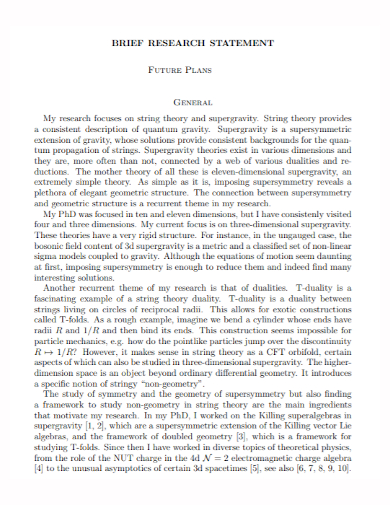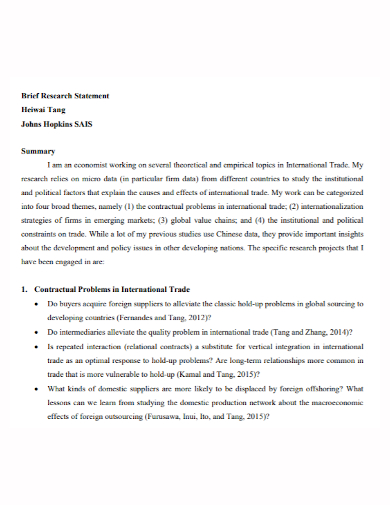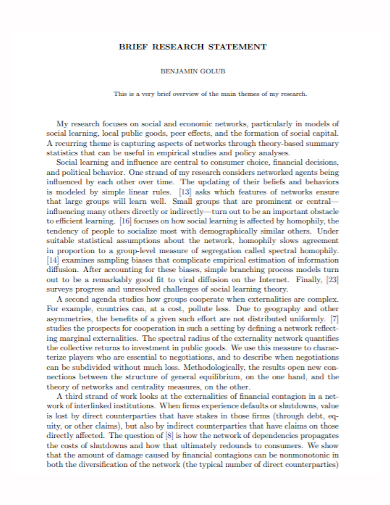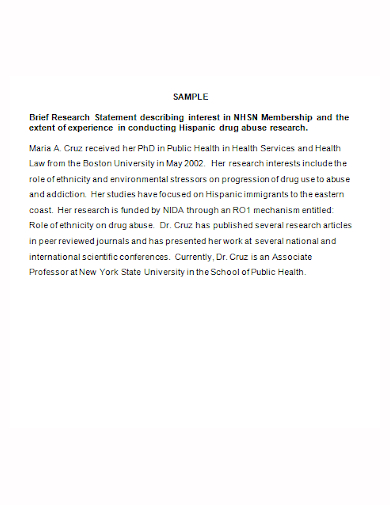The research statement is a common component of a potential candidate’s application for post-undergraduate study. This may include applications for graduate programs, post-doctoral fellowships, or faculty positions. The research statement is often the primary way that a committee determines if a candidate’s interests and past experience make them a good fit for their program/institution.
3+ Brief Research Statement Samples
1. Future Plan Brief Research Statement
2. Brief Problem Research Statement
3. Brief Research Statement
4. Sample Brief Research Statement
What is a Research Statement?
A research statement is a document that summarizes your research interests, accomplishments, current research, and future research conduction plans. Furthermore, it outlines how your work contributes to the field. It allows applicants to present the importance and impact of their past, current, and future research to their potential future colleagues. However, throughout your academic career, you may be asked to prepare similar documents for annual reviews, tenure packages, or promotion.
How to Write Your Brief Research Statement?
An effective research statement must present a clear narrative of the relation between your past and current research. Additionally, it should clearly state how your research aligns with the goals, resources, and needs of the institution to which you are applying.
Here we discuss 5 simple tips for writing a good research statement:
1. Make Your Research Statement Reader-Friendly
As stated earlier, a faculty position may easily receive over a couple of hundred applications. Consequently, the search committee may just glance through some applications. Therefore, you must make your research statement reader-friendly.
Following tips will allow readers to quickly determine why should they select you over other applicants:
- Organize your ideas by using headings and sub-headings.
- Space out different sections properly.
- Additionally, include figures and diagrams to illustrate key findings or concepts.
- Avoid writing long paragraphs in your research statement. Moreover, a concise yet thoughtfully laid out research statement demonstrates your ability to organize ideas in a coherent and easy-to-understand manner.
2. Ensure to Present Your Focus on Research
- Discuss feasible research ideas that interest you.
- Explain how your goals are related to your recent work.
- Additionally, mention your short-term (2-5 years) and long-term (5+ years) research goals.
- Discuss your ideas about potential funding sources, collaborative partners, facilities, etc.
- Specifically mention how your research goals align with your department’s goals.
3. Tailor Your Research Statement
- It is imperative to mention how you will contribute to the research at the institution you are applying to.
- Mention how will you use core facilities or resources at the institution.
- Furthermore, you should mention particular research infrastructure present at the target institution that you may need to do your work.
4. Write for Each Audience
- Even at top-most institutions, not all members of the search committee may be aware of the intricacies of your research work. Therefore, you should avoid jargon and describe your research work in a detailed yet lucid manner.
- Your motive must be to instill a sense of belief in the reader that you are a dedicated researcher and not overwhelm them with finer details.
- Moreover, focus on conveying the importance of your work and its contribution to the field.
5. Be Yourself
In an attempt to impress the search committee, applicants are often seen to go overboard and come out as boastful.
- Emphasize your major academic achievements.
- Be realistic and do not present research goals that are too ambitious.
- Finally, avoid comparing your research statement with other applicants.
FAQs
What is the purpose of a research statement?
Three key purposes of a research statement are:
- Clear presentation of your academic feats.
- Description of your research in a broader context, both scientifically and societally.
- Laying out a clear road map for future endeavors concerning the newly applied position.
How long should a brief research statement be?
Unlike an abstract, which summarizes a single project, a research statement should summarize your current interests, describe the direction you plan to pursue, and how your work contributes to your field. General Guidelines: Usually one to two pages in length but no longer than three pages.
What is the difference between a research statement and a personal statement?
Whereas the statement of purpose showcases your academic strengths and background, career goals, research interests, and fit with the program, the personal statement highlights your personal motivations for applying to the program and any major accomplishments you’ve had or challenges you’ve faced along the way.
What is the difference between a research statement and a curriculum vitae?
While your CV gives an overview of your past research projects, it does not address the details of conducted research or future research interests. Furthermore, a CV fails to answer some questions that can be easily answered through a research statement.
- Why are you interested in a particular research topic?
- Why is your research important?
- What techniques do you use?
- How have you contributed to your field?
- How can your research be applied commercially or academically?
- Does your research have an impact on allied fields?
- Is your research directing you to newer questions?
- How do you plan to develop new skills and knowledge?
Did you decide on the faculty position you want to apply for? How do you plan to go ahead with your research statement? To help you get started writing the research statement, download our free sample templates above to use as your guide!
Related Posts
FREE 10+ Scholarship Statement of Purpose Samples in PDF | DOC
FREE 10+ Engineering Problem Statement Samples [ Software, Mechanical, Civil ]
FREE 30+ Information Statement Samples in PDF | MS Word
FREE 50+ Policy Statement Samples in MS Word | Google Docs | PDF
FREE 50+ Summary Statement Samples in PDF | MS Word
FREE 10+ Nursing School Personal Statement in PDF
FREE 9+ Mortgage Statement Samples and Templates in PDF
FREE 10+ Independent Subcontractor Statement Samples in MS Word | Google Docs | Apple Pages | PDF
FREE 10+ Trust Distribution Statement Samples in PDF
FREE 14+ Compliance Statement Samples & Templates in PDF | MS Word
FREE 10+ Extension Impact Statement Samples in PDF | DOC
FREE 10+ Bank Reconciliation Statement Samples and Templates in PDF | MS Word
FREE 10+ Diversity Mission Statement Samples in MS Word | PDF
FREE 10+ Architecture Statement of Purpose Samples [ Sustainable, Graduate, Master ]
FREE 13+ Project Scope Statement Samples in PDF | MS Word




